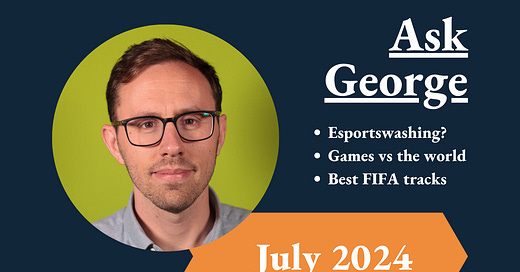Esportswashing, video games vs the rest of the world and best FIFA soundtracks - Ask George, July 2024
Who is Busy Earnin' in Riyadh?
Good lord, it’s time for the second Ask George already? Won’t someone give me a break from the relentless march of time for just a second?
Alas not. But fortunately, you did give me something of a break by throwing me another three fantastic questions for me to field for the benefit of my wonderful VGIM Insiders.
If you want to read beyond the first answer, you’ll need to stump up some cold hard wonga for the privilege.
Today’s the last day you can use my KEENBEAN 20% off discount to buy VGIM membership for just £5 a month or £40 a year.
Hit the button below OR ELSE…you’ll have to buy at full price *coughs*.
Anyway, let’s get on with the first question.
Is Saudi Arabia’s support for the Esports World Cup a genuine investment into the future of the industry or another form of sportswashing? - Sam
Let’s start somewhere light, eh Sam? Anyway, the answer is that it is almost certainly ‘both’.
Saudi Arabia’s support for The Esports World Cup project is enormous. Muhammed Bin Salman, the country’s Crown Prince and Prime Minister, announced last year that it was a key part of realising the country’s Vision 2030 strategy to modernise the economy.
The extent of the tournament is staggering, with 1500 esports athletes competing across six weeks in a range of over 20 games that truly represents an ‘East meets West’ of competitive video gaming.
And the prize pot for the tournament - valued at north of $60m - is enormous, especially in light of the fact that this is the first time that the Esports World Cup has taken place.
I also have reason to believe that the sense on the ground is that support for it is genuinely sincere.
Having chatted to a few contacts after receiving this question, the country’s leadership is enthusiastic in its support for developing the esports ecosystem both domestically and globally.
This is best seen in the ‘constructors championship’ style points system around the World Cup, which will ensure that all the teams participating in the competition will receive a hefty chunk of change for their involvement (without being overly reliant on winning individual game contests).
Nevertheless, it is impossible to say that Saudi Arabia’s support for esports can be divorced from its efforts to change its reputation.
Given the turgid state of the esports economy across the world outside of China, Korea and parts of North America, Saudi Arabia’s investment of the best part of quarter of a billion dollars into this tournament - after having already spent $1.5bn on ESL Face It - makes the country inseparable from the overall ecosystem.
And though esports may not have the consistent reach of the Olympics or an international football tournament, the fact that I was asked to discuss it by broadcasters and news outlets on three different continents last week suggests it is giving the country a reputational edge.
However, Saudi Arabia’s investment in esports - and video games more generally - doesn’t happen in a vacuum.
Other national governments could choose to invest in esports and games to counter that influence but have consistently chosen not to. This gives businesses in the space a choice: take cash on the table from a nation state you may disagree with or reject the cash and struggle to survive.
So yes, I am pretty sure that Saudi Arabia is genuinely investing in the future of the esports industry because it’s a useful way to buff its reputation.
But the fact that no other nation states are really challenging it - especially amongst Western democracies - is a sign of their failure to recognise where influence may be found in the modern digital economy.
A different approach is needed in the future.
Keep reading with a 7-day free trial
Subscribe to Video Games Industry Memo to keep reading this post and get 7 days of free access to the full post archives.





